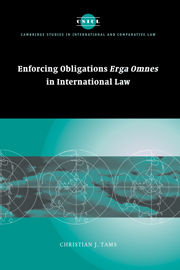Book contents
- Frontmatter
- Contents
- Foreword
- Preface
- Notes on citation
- Table of cases
- List of abbreviations
- Introduction
- Part I Background to the erga omnes concept
- Part II Legal issues raised by the erga omnes concept
- 3 Distinguishing types of erga omnes effects
- 4 Identifying obligations erga omnes
- 5 Standing to institute ICJ proceedings
- 6 Standing to take countermeasures
- 7 Erga omnes enforcement rights and competing enforcement mechanisms
- Conclusion
- Bibliography
- Index
- Cambridge Studies in International and Comparative Law
6 - Standing to take countermeasures
Published online by Cambridge University Press: 24 July 2009
- Frontmatter
- Contents
- Foreword
- Preface
- Notes on citation
- Table of cases
- List of abbreviations
- Introduction
- Part I Background to the erga omnes concept
- Part II Legal issues raised by the erga omnes concept
- 3 Distinguishing types of erga omnes effects
- 4 Identifying obligations erga omnes
- 5 Standing to institute ICJ proceedings
- 6 Standing to take countermeasures
- 7 Erga omnes enforcement rights and competing enforcement mechanisms
- Conclusion
- Bibliography
- Index
- Cambridge Studies in International and Comparative Law
Summary
Although made in the context of ICJ proceedings, the Barcelona Traction dictum is claimed to have affected other forms of responses. In particular, it has prompted discussion about whether individual States, irrepective of individual injury, should be entitled to take countermeasures in respect of breaches of obligations erga omnes. As has been shown above, the traditional regime of countermeasures had been in a state of tension: while standing was largely restricted to individually injured States, exceptions were recognised or discussed in a number of areas (such as, for example, obligations under interdependent treaties, status treaties, or deriving from ICJ judgments). In contrast, despite some evidence in State practice, there had been only limited support for the view that all States should be entitled to respond, by way of countermeasure, against breaches of particularly important obligations. The present chapter assesses whether the erga omnes concept has affected these legal rules, more particularly: whether all States are entitled to take countermeasures in response to breaches of those particularly important obligations that qualify as obligations erga omnes.
It is evident that such a development would be of fundamental importance. Unlike the right to institute erga omnes proceedings before the ICJ, the right to take countermeasures would not be subject to jurisdictional constraints; it could be exercised by all States, and, more importantly, against all States (and not only against States having consented to the Court's jurisdiction).
- Type
- Chapter
- Information
- Enforcing Obligations Erga Omnes in International Law , pp. 198 - 251Publisher: Cambridge University PressPrint publication year: 2005

